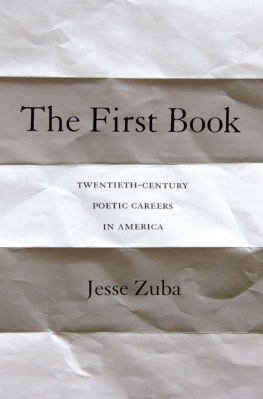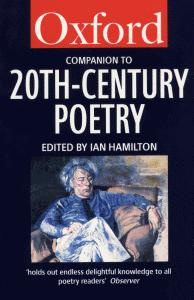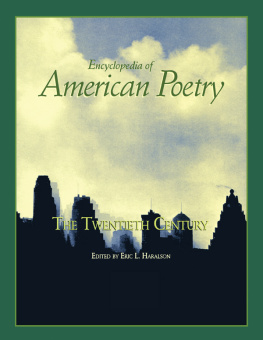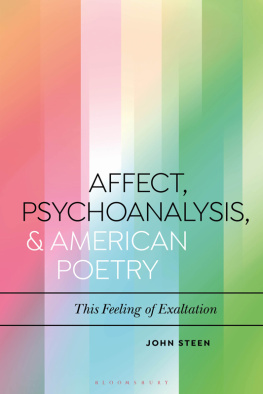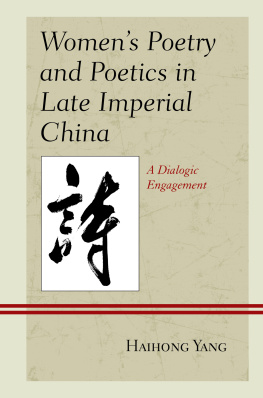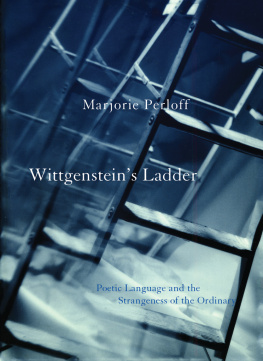
THE FIRST BOOK
The First Book
TWENTIETH-CENTURY
POETIC CAREERS
IN AMERICA
Jesse Zuba
PRINCETON UNIVERSITY PRESS
PRINCETON AND OXFORD
Copyright 2016 by Princeton University Press
Published by Princeton University Press,
41 William Street, Princeton, New Jersey 08540
In the United Kingdom: Princeton University Press,
6 Oxford Street, Woodstock, Oxfordshire OX20 1TW
press.princeton.edu
Two Scenes is from Some Trees by John Ashbery. Copyright 1956, 1978 by John Ashbery. Reprinted by permission of Georges Borchardt, Inc. and Carcanet Press (UK), on behalf of the author.
Excerpt from A Wave is from A Wave by John Ashbery. Copyright 1981, 1982, 1983, 1984 by John Ashbery. Reprinted by permission of Georges Borchardt, Inc. and Carcanet Press (UK), on behalf of the author.
Excerpt from Education of the Poet is from Proofs And Theories: Essays On Poetry by Louise Glck. Copyright 1994 by Louise Glck. Reprinted by permission of HarperCollins Publishers.
Excerpt from Recent Poetry by Randall Jarrell is from the Yale Review. Copyright 1956 by Yale University. Reprinted by permission of John Wiley & Sons, Inc.
Diligence Is to Magic as Progress Is to Flight and To an Intra-Mural Rat from Observations by Marianne Moore are reprinted by permission of the Special Collections Library, Pennsylvania State University Libraries.
Its Form is from The Lion Bridge by Michael Palmer, copyright 1998 by Michael Palmer. Reprinted by permission of New Directions Publishing Corp.
All Rights Reserved
ISBN 978-0-691-16447-2
Library of Congress Control Number: 2015934756
British Library Cataloging-in-Publication Data is available
This book has been composed in Granjon LT Std
Printed on acid-free paper.
Printed in the United States of America
1 3 5 7 9 10 8 6 4 2
To my family
Contents
1 Apprentices to Chance Event:
First Books of the 1920s 21
2 Poets of the First Book, Writers of Promise:
Beginning in the Era of the First-Book Prize 68
3 Everything Has a Schedule:
John Ashberys Some Trees104
4 From Firstborn to Vita Nova:
Louise Glcks Born-Again Professionalism 128
Acknowledgments
I am deeply grateful to my teachers, friends, and family for help that has come in so many forms that the distinctions between teachers and friends, friends and family, family and teachers seem irrelevant. This book began as a dissertation at Yale University. My advisers, Langdon Hammer and Amy Hungerford, have been extraordinarily encouraging and supportive throughout every stage of my work: there isnt a word in these pages that doesnt owe something to their advice and examples as teachers and scholars. Paul Fry offered generous responses to each chapter of my first draft and provided me with a detailed report on the whole that I have returned to time and again throughout the revision process. I am indebted to Leslie Brisman and Wes Davis for insightful responses to an earlier version of the manuscript, to Linda Peterson for guiding me through the dissertation process, and to Wai Chee Dimock, Lawrence Manley, and Claude Rawson for helping me to think about literary vocation outside of the context of twentieth-century American poetry. benefited from a thoughtful reading by Ala Alryyes, Jill Campbell, and John Muse. Harold Bloom deserves more thanks than I could possibly express herefor guidance, encouragement, and especially the gift of his time.
Stephen Burt and James Longenbach provided unbelievably detailed and insightful responses to the manuscript for Princeton University Press. I thank Alison MacKeen, who first took the project on, both for believing in it and for finding such sympathetic readers. Anne Savarese is everything one could ask for in an editor: would that every writers work could be read so carefully and improved so much. Ellen Foos deftly guided the manuscript through the production process, Juliana Fidler helped with permissions, and Brittany Ericksen provided expert copyediting. Theresa Liu cheered me on and helped me out as the project approached completion.
first appeared, for their helpful comments and suggestions. I am also grateful for the opportunity to present my work in progress to audiences at Delaware State University, the New School for Social Research, and New York University.
Several trains of thought that inform this book began in conversations with teachers at Princeton, including Michael Wood, who introduced me to modern poetry. William Howarth introduced me to Emerson and Whitman, and it was with him that I first developed the idea of studying poetic debuts. James Richardson introduced me to contemporary poetry; for that, and also for his encouragement and friendship, I am hugely grateful.
While working on this book, it has been my good fortune to have taught alongside Tanya Clark, Joe Coulombe, Theresa Craig, Bill Freind, Zena Meadowsong, Cathy Parrish, Bruce Plourde, Lee Talley, and Tim Viator at Rowan University and Joe Amoako, Amanda Anderson, Fidelis Odun Balogun, Natalie Belcher, Andrew Blake, Dawn Bordley, Adenike Davidson, Ed Dawley, Joseph Fees, Tina George, Victor Gomia, Myrna Nurse, Susmita Roye, Ladji Sacko, Sandra Sokowski, and Angmoor Teye at Delaware State University. Students too many to name have inspired me and refreshed my interest in poetry over the years; still, I have to mention Kristen Brozina Angelucci in order to return the favor of mentioning me in the acknowledgments to her best-selling first book, The Reading Promise. Michael and Mary Pat Robertson encouraged and supported me throughout my work. I would also like to thank Provost Alton Thompson at Delaware State for an Academic Enrichment Award that helped me to see the book through to publication.
Stuart Watson and Samuel Arkin challenged and inspired me during my first semester as a teaching fellow at Yale, and they have continued to do so by making time in their own evolving literary careers to read versions of several of these chapters. Christopher van den Berg and Brett Foster provided good company as well as intellectual and moral support during our time together in New Haven and afterward. Brooke Conti gave me helpful advice on navigating the publication process.
My parents, Monica and Philip Zuba, have provided every kind of support since day one: it would be impossible to ever thank them enough. Conversations with Scarlett Lovell helped me clarify my thinking, and Bruce Burgess helped me stay the course with the interest he took in my work. My brothers, Colter, Andrew, and Morgan, helped me take breaks from my work even as they pushed me to finish it. Sarah Zuba has been patiently reading drafts of this book for years: her love and encouragement mean everything to me. It is to her, and to our children, Luke and Sadie, that I dedicate this book.
Earlier versions of appeared in American Literature 82.4 (December 2010) and Twentieth-Century Literature 59.2 (Summer 2013), respectively. I am grateful to Duke University Press and the editors of both journals for permission to reprint material from those sources.
Abbreviations
BMM | Marianne Moore, Becoming Marianne Moore: The Early Poems, 19071924. Edited by Robin G. Schulze. Berkeley: University of California Press, 2002. |
FCP | Pierre Bourdieu, The Field of Cultural Production. Edited by Randal Johnson. New York: Columbia University Press, 1993. |
|
Next page
